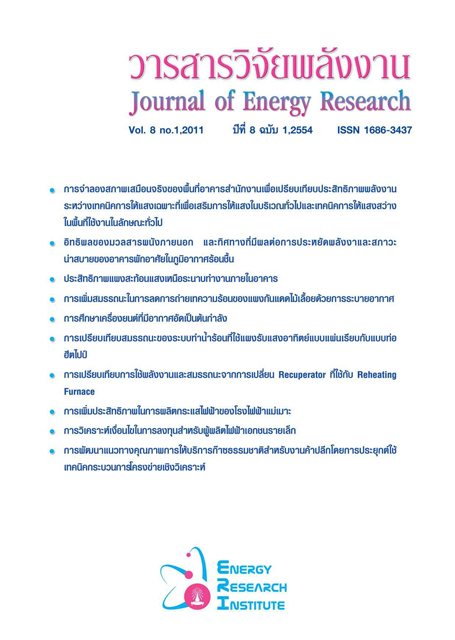การพัฒนาแนวทางคุณภาพการให้บริการก๊าซธรรมชาติสำหรับงานค้าปลีก โดยการประยุกต์ใช้เทคนิคกระบวนการโครงข่ายเชิงวิเคราะห์
Main Article Content
Abstract
งานวิจัยนี้มีวัตถุประสงค์เพื่อพัฒนาดัชนีวัดผลการดำเนินงานหลักที่มีความเหมาะสมในทางปฏิบัติและสามารถสะท้อนถึงคุณภาพการให้บริการก๊าซธรรมชาติสำหรับงานค้าปลีกของบริษัทกรณีศึกษา รวมทั้งยังใช้ดัชนีในการกำกับดูแลและประเมินผลการดำเนินงานของบริษัทกรณีศึกษาอีกด้วย การวิจัยจึงเริ่มต้นจากการศึกษาและรวบรวมดัชนีวัดผลการดำเนินงานของบริษัทกรณีศึกษาและของต่างประเทศ และทำการจำแนกดัชนีที่ได้ออกเป็น 4 มุมมอง ตามแนวคิดของสหภาพยุโรป ได้แก่ คุณภาพ ความต่อเนื่อง ความเชื่อถือได้ และความพึงพอใจของลูกค้า พร้อมทั้งทำการเทียบเคียงดัชนีจนได้ดัชนีทั้งหมด 83 ตัว หลังจากนั้น จึงจัดทำแบบสอบถามเพื่อใช้ในการสอบถามความคิดเห็นจากคณะผู้บริหารของบริษัทกรณีศึกษาและใช้ในการคัดเลือกดัชนีในแต่ละมุมมองภายใต้เกณฑ์หลัก 2 เกณฑ์ คือ เกณฑ์ด้านความเหมาะสมกับองค์กร และเกณฑ์ความพร้อมของข้อมูล โดยมีการประยุกต์ใช้เทคนิคกระบวนการโครงข่ายเชิงวิเคราะห์ในการจัดลำดับความสำคัญของมุมมองและเกณฑ์ที่ใช้ในการคัดเลือกดัชนี และประมวลผลโดยใช้โปรแกรม Super Decisions 2.0.8 จนกระทั่งได้ดัชนีที่ครอบคลุมมุมมองทั้ง 4 มุมมอง จำนวน 28 ตัว และนำดัชนีดังกล่าวไปสอบถามความคิดเห็นจากคณะผู้บริหารของบริษัทกรณีศึกษาและภาคส่วนที่เกี่ยวข้อง ท้ายที่สุด จึงได้ดัชนีวัดผลการดำเนินงานหลักที่มีความเหมาะสมและได้รับความเห็นชอบจากทุกภาคส่วนจำนวน 10 ตัว
Development of Natural Gas Service Quality Guidelines for RetailUsing Analytic Network Process
The purpose of this research is to develop key performance indicators (KPIs) suitable for practicing and reflecting natural gas service quality for retail of the studied company. It also includes the existing controlling and evaluating indices of the studied company to be synchronized with the company’s goals. The research starts with studying and collecting all related KPIs of both studied company and comparable global practices, which leads to the next step to categorize them to four aspects based on EU’s concept; i.e., quality, continuity, reliability, and customer satisfaction. As a result of the benchmarking, the 83 indicators are selected and obtained to derive questionnaire for responding the director’s opinions and refining indicators specialized for each aspect fallen within 2 main criteria, which are consistency of the organization and readiness of the data. The analytic network process (ANP) is then employed to prioritize and support robust multicriteria decision-making, which is compiled by Super Decisions 2.0.8 resulting 28 indicators covering four aspects as stated earlier. These indicators are then expressed the opinions by company’ directors and related sector personnel that finally deliver the most suitable and acceptable 10 KPIs.

